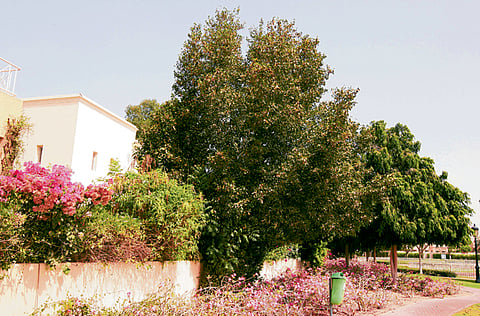Green and dangerous
Beneath its dense, sweeping foliage, the damas tree is wreaking havoc on homes and communities in Dubai. Some residents and developers are now blaming each other for the environmental backlash

The UAE has a love-hate relationship with the damas tree. Residents seeking instant landscaping or privacy turn to the fast-growing Conacarpus lancifolious tree. Developers and landscaping experts, who have seen how these trees have damaged underground pipes, irrigation systems, pools, drains and boundary walls, are not so keen.
It’s a conflict spreading from community to community quicker than the time it takes the tree’s roots to grab hold of the soil.
The latest community to fall victim to the standoff is Jumeirah Village Triangle (JVT), where there are many damas trees that homeowners plant to serve as high foliage walls.
Damas trees thrive in hot, arid conditions and are commonly used for quick, easy and cheap landscaping and as a way of covering large spaces in a short amount of time. They are often used as "screen trees" as they are inexpensive, require minimal irrigation and are fast-growing with dense foliage.
In 2011, developer Emaar was accused of not showing concern for the environment when it felled thousands of damas trees lining the streets of the majority of its master-planned communities in Dubai. Residents at Arabian Ranches, The Greens, The Springs, The Lakes, The Meadows and Emirates Hills were ordered to do the same.
This caused an uproar until the Dubai Municipality released a bulletin explaining the potential damage the trees were capable of causing. It was revealed that the monthly water and electricity bills of a number of residents reached more than Dh5,000 because the roots of the trees were sapping water from the irrigation system. Boundary walls were reduced to rubble and, in some cases, underground pipes were damaged, causing severe flooding.
A spokesperson for Emaar Properties said then the company was "in the process of replacing the damas trees from communities, depending on their location and proximity to homes".
The spokesperson continued: "We are discouraging our community residents from planting the trees due to the potential damage they can cause and the repair costs thereby incurred. We are encouraging them to remove the trees from their gardens to avoid any possible concerns."
Tenant’s plea
Tony Ptohopoulos, 41, has been renting a villa in JVT’s District Two for the past five months. The British expatriate received a letter from developer Nakheel stating he must remove the trees in his property immediately. Ptohopoulos claims he has tried to contact Nakheel about the issue on several occasions, but with little success.
"The trees were already there when we arrived," he says. "We received a warning from Nakheel that if we didn’t cut down the trees in the garden, they would cut off all our utilities and rubbish collection services."
Nakheel eventually suspended garbage collection for almost one month.
Ptohopoulos says since it was Nakheel that planted the trees, the developer should foot the bill to remove them.
"There are still damas trees in the public areas, but Nakheel has not removed them yet. [It’s] double standards," he says.
The trees were eventually removed by Ptohopoulos’ landlord, Imran Owais Kazmi, who spent almost Dh3,000 to plant, irrigate and later on fell the trees. It took two days to remove the trees, which also created a major disruption for the tenant.
"The garden is a huge mess and it still hasn’t been cleaned up," says Ptohopoulos.
Online comments
Over the past few months, the JVT Facebook page has been inundated with comments from residents facing similar problems.
Kazmi contacted Nakheel, but was told he had no choice but to remove the trees as soon as possible.
To replace the damas trees, Ptohopoulos will have to plant approved trees, but he is not willing to foot the bill.
"We have, however, bought a few fast-growing plants to decorate the garden," he says. "We took the villa because of the privacy in the garden due to the trees. We feel let down by Nakheel, as the trees were not our fault. [With the trees] now removed, we feel exposed to neighbours, traffic and pedestrians."
Nakheel’s response
Rebecca Rees, Nakheel Corporate Communications Manager, released the following statement when contacted by Property Weekly: "The planting of damas trees is prohibited under both the Dubai Municipality guidelines and the JVT community rules and regulations. These trees are not suitable for residential areas as they can cause severe destruction to subsurface pipes and building foundations.
"We first issued notices warning about the damage that damas trees can cause more than a year ago, and, more recently, have issued reminders to those who continue to violate the rules. We will continue to carry out inspections and take action as necessary.
"The damas tree issue affects all community developments in Dubai, and is not unique to Nakheel communities or to JVT."
Kazmi said the fact the developer continues to plant damas trees in public areas is "a further shame on them".
"After reaching out to Nakheel’s management, I felt the response I received was unsatisfactory, high-handed, inconsiderate and not at all helpful," he said. "Stopping the garbage collection was an unwarranted and cheap tactic by Nakheel. You cannot stop basic and necessary services based on a new rule. We felt if they [the trees] must be removed, Nakheel could have at least shared the cost."
Sign up for the Daily Briefing
Get the latest news and updates straight to your inbox



